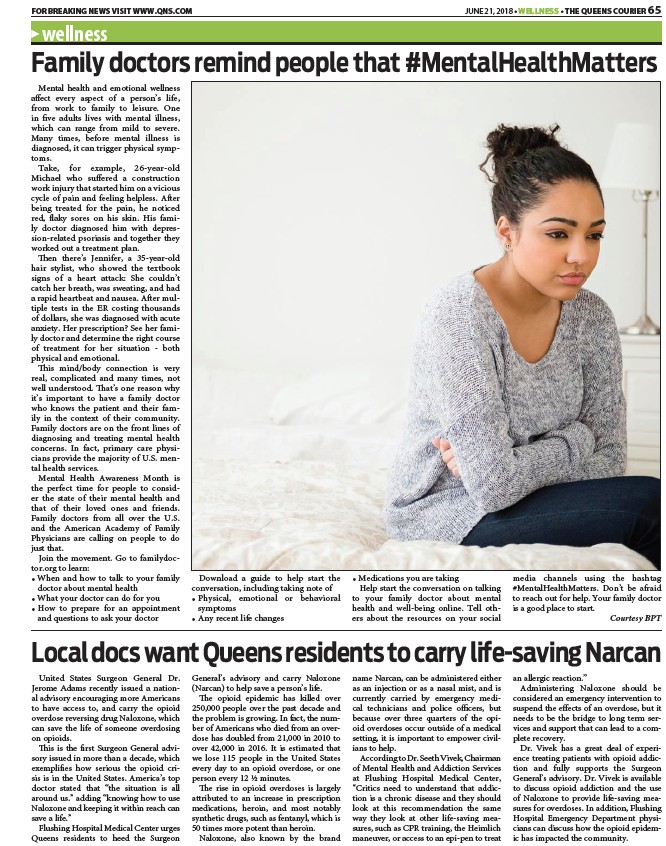
FOR BREAKING NEWS VISIT WWW.QNS.COM JUNE 21, 2018 • WELLNESS • THE QUEENS COURIER 65
wellness
Family doctors remind people that #MentalHealthMatters
Mental health and emotional wellness
aff ect every aspect of a person’s life,
from work to family to leisure. One
in fi ve adults lives with mental illness,
which can range from mild to severe.
Many times, before mental illness is
diagnosed, it can trigger physical symptoms.
Take, for example, 26-year-old
Michael who suff ered a construction
work injury that started him on a vicious
cycle of pain and feeling helpless. Aft er
being treated for the pain, he noticed
red, fl aky sores on his skin. His family
doctor diagnosed him with depression
related psoriasis and together they
worked out a treatment plan.
Th en there’s Jennifer, a 35-year-old
hair stylist, who showed the textbook
signs of a heart attack: She couldn’t
catch her breath, was sweating, and had
a rapid heartbeat and nausea. Aft er multiple
tests in the ER costing thousands
of dollars, she was diagnosed with acute
anxiety. Her prescription? See her family
doctor and determine the right course
of treatment for her situation - both
physical and emotional.
Th is mind/body connection is very
real, complicated and many times, not
well understood. Th at’s one reason why
it’s important to have a family doctor
who knows the patient and their family
in the context of their community.
Family doctors are on the front lines of
diagnosing and treating mental health
concerns. In fact, primary care physicians
provide the majority of U.S. mental
health services.
Mental Health Awareness Month is
the perfect time for people to consider
the state of their mental health and
that of their loved ones and friends.
Family doctors from all over the U.S.
and the American Academy of Family
Physicians are calling on people to do
just that.
Join the movement. Go to familydoctor.
org to learn:
• When and how to talk to your family
doctor about mental health
• What your doctor can do for you
• How to prepare for an appointment
and questions to ask your doctor
Download a guide to help start the
conversation, including taking note of
• Physical, emotional or behavioral
symptoms
• Any recent life changes
• Medications you are taking
Help start the conversation on talking
to your family doctor about mental
health and well-being online. Tell others
about the resources on your social
media channels using the hashtag
#MentalHealthMatters. Don’t be afraid
to reach out for help. Your family doctor
is a good place to start.
Courtesy BPT
Local docs want Queens residents to carry life-saving Narcan
United States Surgeon General Dr.
Jerome Adams recently issued a national
advisory encouraging more Americans
to have access to, and carry the opioid
overdose reversing drug Naloxone, which
can save the life of someone overdosing
on opioids.
Th is is the fi rst Surgeon General advisory
issued in more than a decade, which
exemplifi es how serious the opioid crisis
is in the United States. America’s top
doctor stated that “the situation is all
around us.” adding “knowing how to use
Naloxone and keeping it within reach can
save a life.”
Flushing Hospital Medical Center urges
Queens residents to heed the Surgeon
General’s advisory and carry Naloxone
(Narcan) to help save a person’s life.
Th e opioid epidemic has killed over
250,000 people over the past decade and
the problem is growing. In fact, the number
of Americans who died from an overdose
has doubled from 21,000 in 2010 to
over 42,000 in 2016. It is estimated that
we lose 115 people in the United States
every day to an opioid overdose, or one
person every 12 ½ minutes.
Th e rise in opioid overdoses is largely
attributed to an increase in prescription
medications, heroin, and most notably
synthetic drugs, such as fentanyl, which is
50 times more potent than heroin.
Naloxone, also known by the brand
name Narcan, can be administered either
as an injection or as a nasal mist, and is
currently carried by emergency medical
technicians and police offi cers, but
because over three quarters of the opioid
overdoses occur outside of a medical
setting, it is important to empower civilians
to help.
According to Dr. Seeth Vivek, Chairman
of Mental Health and Addiction Services
at Flushing Hospital Medical Center,
“Critics need to understand that addiction
is a chronic disease and they should
look at this recommendation the same
way they look at other life-saving measures,
such as CPR training, the Heimlich
maneuver, or access to an epi-pen to treat
an allergic reaction.”
Administering Naloxone should be
considered an emergency intervention to
suspend the eff ects of an overdose, but it
needs to be the bridge to long term services
and support that can lead to a complete
recovery.
Dr. Vivek has a great deal of experience
treating patients with opioid addiction
and fully supports the Surgeon
General’s advisory. Dr. Vivek is available
to discuss opioid addiction and the use
of Naloxone to provide life-saving measures
for overdoses. In addition, Flushing
Hospital Emergency Department physicians
can discuss how the opioid epidemic
has impacted the community.